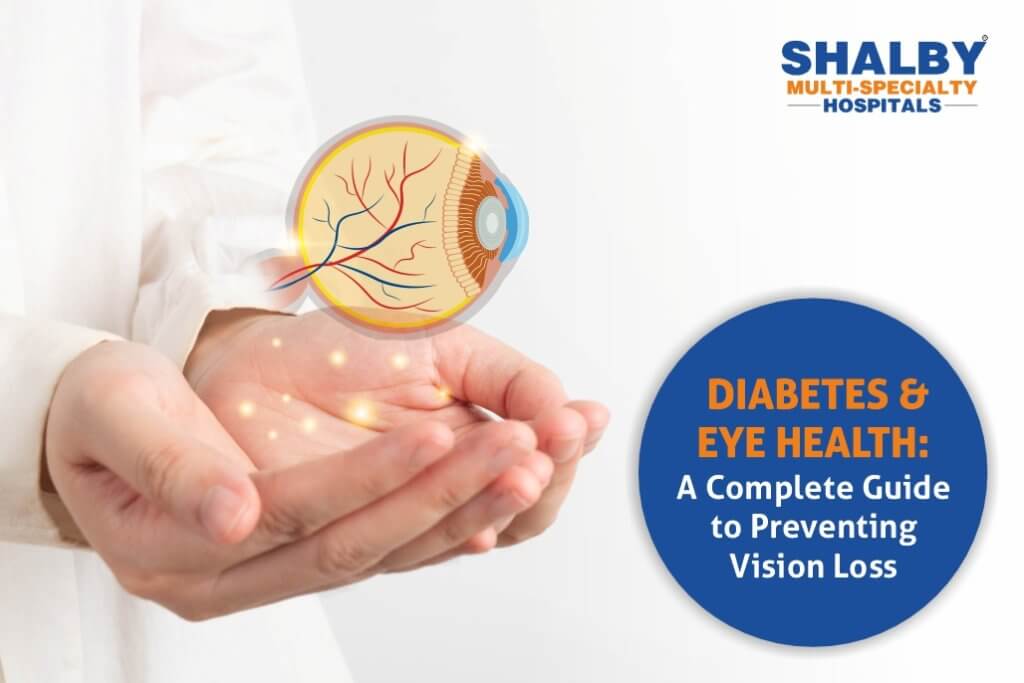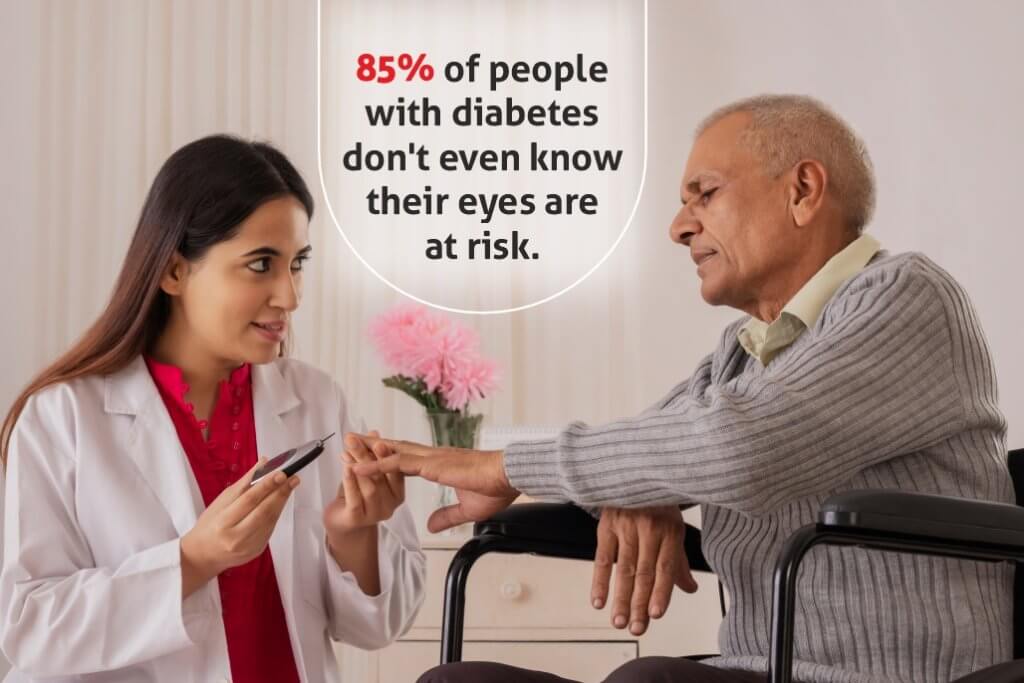
Diabetes and eye health are deeply connected, and unmanaged diabetes can lead to vision problems or even permanent vision loss. Early action, expert advice, and the right healthcare support make all the difference. Here’s a simple, clear guide to understanding why diabetic eye care matters, signs to watch out for, and how to protect your vision for life.
High blood sugar affects tiny blood vessels in the back of your eye, called the retina. Over time, these vessels become weak, leak fluid or blood, and may block, which leads to diabetic retinopathy and vision loss if not treated. Diabetes also increases the risk of cataract (clouding of lens) and glaucoma (high eye pressure damaging the optic nerve), both of which can cause permanent vision loss when ignored.
Regular check-ups with experienced ophthalmologists help detect these changes early and protect your sight. High blood sugar affects tiny blood vessels in the back of your eyes, called the retina. Over time, these vessels become weak, leak fluid or blood, and may block, which leads to diabetic retinopathy and vision loss if not treated.
Without regular screenings from an experienced ophthalmologist, these conditions can progress and threaten sight.
Although many diabetic eye diseases start without noticeable symptoms, some warning signs need urgent attention:
If you notice any of these, contact a diabetic eye specialist right away.

The good news is that diabetic eye diseases can be prevented or slowed down with proper care. Prevention begins with controlling your blood sugar levels and making eye care a part of your regular diabetes management routine. Here are some important steps to follow:
Uncontrolled diabetes, high blood pressure, and bad cholesterol together can damage the tiny blood vessels in your eyes. Maintaining a healthy balance through medication, diet, and regular monitoring is key.
People with diabetes should have a complete eye examination at least once a year by an Experienced Ophthalmologist. These specialists use special tests to look at the retina and detect even minor changes before vision loss occurs.
Smoking can worsen blood flow problems and increase the risk of retinal damage. Reducing alcohol intake also helps maintain stable blood sugar levels and overall eye health.
A balanced diet rich in green vegetables, citrus fruits, nuts, and fish can support healthy eyes. Foods high in omega-3 fatty acids, vitamin C, and antioxidants help protect the retina and blood vessels.
Physical activity not only helps control diabetes but also improves blood circulation, including to the eyes. Even a 30-minute walk every day can make a difference.
Chronic stress can raise blood sugar levels and harm your overall health. Try yoga, meditation, or deep breathing exercises to stay calm and balanced.
Every part of your body — heart, kidneys, nerves, or eyes — is connected through blood circulation. In diabetes, sugar sticks to the blood vessel walls and causes them to narrow or leak. Over time, this reduces oxygen supply to the eyes, leading to tissue damage. This is why managing diabetes is not just about medicines or insulin — it’s about adopting Holistic Diabetes Care. This includes lifestyle changes, diet control, regular follow-ups, and eye check-ups.
Many people visit hospitals only after they start losing vision. By that time, serious damage may have already occurred. Regular screening can catch diabetic retinopathy in the early stages when it can be easily treated. Modern diagnostic tools such as retinal photography and optical coherence tomography (OCT) help specialists identify even minor changes in the retina. Early treatment using laser therapy, injections, or medications can prevent further vision loss.
If you are living with diabetes, it’s important to find a hospital that understands both your vision and your blood sugar needs. At the Diabetes Care Centre at Shalby, patients get access to both endocrinologists and dedicated Diabetic Eye Specialists under one roof. This ensures complete care — from diagnosis to treatment and long-term follow-up.
Shalby Hospital is known as the Best Eye Hospital in Ahmedabad, with a team of Experienced Ophthalmologists who specialize in diabetic eye disease, cataract surgery, glaucoma treatment, and advanced retinal care. The hospital uses world-class technology for precise eye screening and early detection of complications.
Bottom Line
Diabetes does not have to mean losing your eyesight. With timely care, lifestyle discipline, and regular monitoring, you can continue to enjoy clear vision for years to come. The key is to stay consistent with your check-ups and follow medical advice closely. For anyone seeking trusted and complete diabetes and eye care, Shalby Hospital in Ahmedabad offers the perfect combination of expertise and compassion. Book your consultation today with experienced Ophthalmologist and Diabetic Eye Specialists who can help protect your vision for life.
Diabetes and eye health are deeply connected, and unmanaged diabetes can lead to vision problems or even permanent vision loss. Early action, expert advice, and the right healthcare support make all the difference. Here’s a simple, clear guide to understanding why diabetic...
After the scorching heat, when a monsoon downpour touches the earth, everyone breathes a sigh of relief. Along with the pleasant atmosphere and eye-pleasing greenery, monsoon is also a season of diseases like malaria, dengue, chikungunya and water-borne diseases. But do you...
Glaucoma is a type of condition that damages the optic nerve, and it usually happens when the intraocular pressure of the eye increases. This is a progressive condition that leads to permanent loss of vision if not treated properly and timely. Glaucoma...